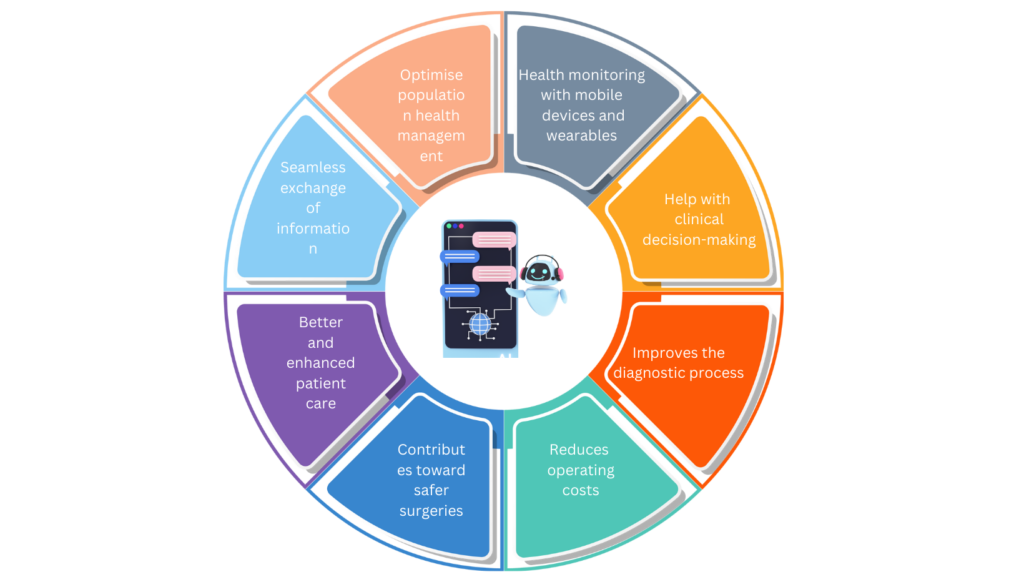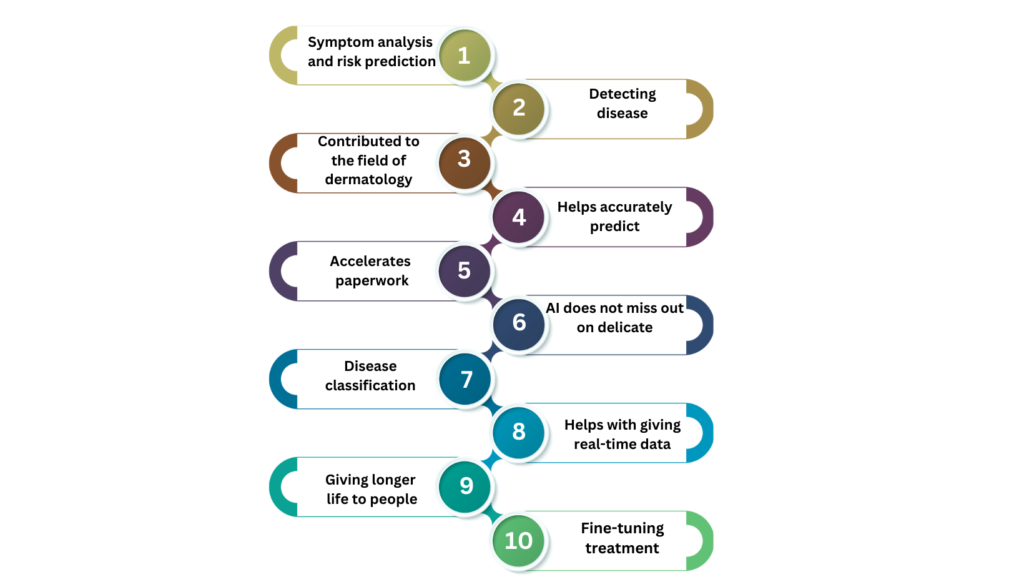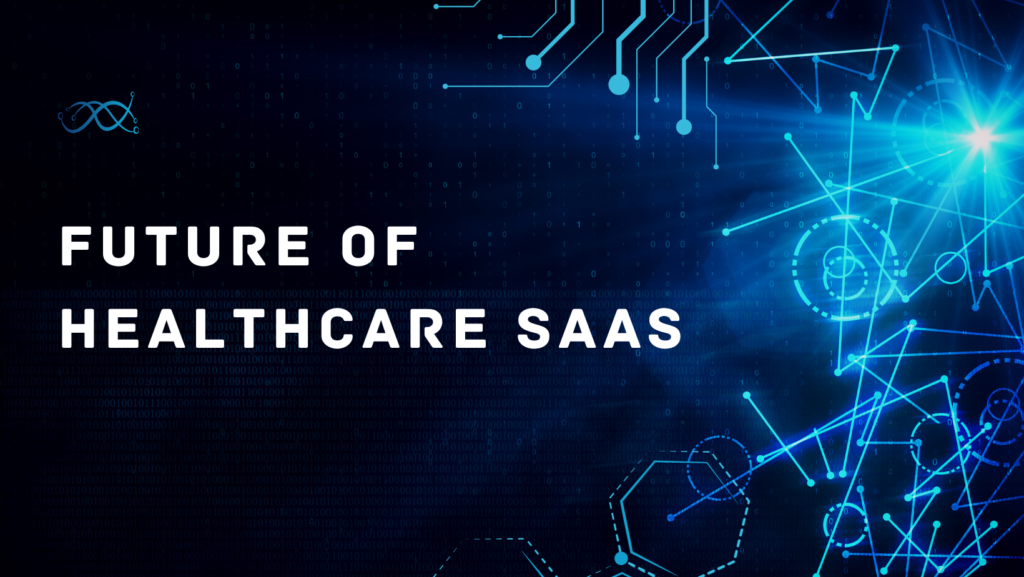Artificial Intelligence (AI), frequently referred to as machine intelligence, is making a considerable impact across various sectors, notably in healthcare. The integration of AI in the medical field holds the potential to greatly improve the lives of patients by advancing diagnostic and treatment processes, aiding patients and healthcare providers in swiftly making essential medical decisions.
AI is gaining momentum in the field of medical care, particularly in the realms of diagnosis, therapeutic management, and the development of healthcare software services. Numerous studies have delved into the ways AI can assist in healthcare decision-making and enhance the judgement of physicians. Now, let’s delve deeper into this topic, starting with a definition of AI in medical care.
What is AI in the healthcare industry?
The healthcare sector is on the verge of a significant transformation, leveraging technology to deliver treatments that are not only more accurate and cost-effective but also timely in a patient’s care journey. AI in the medical field, plays a crucial role in identifying chronic diseases through imaging and risk assessment.
With shifts in payment structures, rising patient expectations from healthcare providers, and an exponential growth in available data, artificial intelligence emerges as the driving force poised to expedite progress throughout the healthcare ecosystem.
In what ways is Artificial Intelligence contributing to the overall enhancement of the healthcare sector?
How is Artificial Intelligence shaping the future of the healthcare sector, given the global AI healthcare market’s valuation of $7.4 billion in 2021 and the projected 49% CAGR from 2022 to 2027, aiming to reach around $48.77 billion by 2027? With a focus on transforming treatment methods and refining data collection, AI in healthcare seeks to achieve its ultimate goal of enhancing patient outcomes, leveraging collected data for intricate disease diagnostics, and facilitating more effective treatment procedures.

1.Health monitoring with mobile devices and wearables
The ubiquity of devices equipped with sensors for gathering and analysing vital health data is now commonplace. From smartphones with built-in activity trackers to devices capable of continuous heart rate monitoring, a majority of the population possesses such technology. As individuals generate an increasing volume of health-related information on the go through smartphones, smartwatches, and other gadgets, the need for analysis and interpretation becomes paramount.
Examining this data, combined with information shared by individuals through apps and personal diagnostic devices, provides a distinctive perspective on both individual and community health. The utilisation of artificial intelligence in the field of medicine becomes crucial for extracting meaningful insights from this extensive and diverse collection of data. This underscores the pivotal role of AI in medical diagnosis.
2.Help with clinical decision-making
Within a physician’s multifaceted responsibilities, a critical aspect involves the diagnosis of disorders and diseases, as well as the formulation of treatment plans for patients. However, for the typical clinician, this can be a challenging, time-intensive, and occasionally stressful undertaking. It often involves extensive research and meticulous problem-solving, addressing issues that may not even have clear solutions.
3. Improves the diagnostic process
AI brings about improved efficiency in medical diagnostics, offering a distinct advantage. In healthcare settings, a lack of medical history and a high caseload can contribute to manual errors. In contrast to human counterparts, AI systems demonstrate the capability to predict and diagnose diseases more rapidly and with a reduced risk of errors. However, the effectiveness is contingent upon robust data quality.
4.Reduces operating costs
The integration of artificial intelligence into medical diagnosis can achieve comparable results at a fraction of the initial cost. For instance, if AI is capable of scanning millions of images for signs of illness, it eliminates the necessity for labour-intensive manual efforts. This not only results in quicker and more effective patient treatment but also diminishes admissions, lengthy waiting times, and the strain on bed availability.
5.Contributes toward safer surgeries
AI is making significant strides in healthcare robotics, providing effective and unique support during surgeries. Surgeons benefit from improved dexterity, allowing them to operate in confined spaces that might typically require open surgery. Robots demonstrate heightened precision when manoeuvring around delicate organs and tissues, leading to decreased blood loss, lower risk of contamination, and reduced postoperative pain. Patients undergoing robotic surgery often experience diminished scarring and swift recovery due to the smaller incisions involved.
6.Better and enhanced patient care
Healthcare settings often grapple with overcrowding and disarray, leading to a subpar patient experience. A recent study reveals that 83% of patients identify poor communication as the most detrimental aspect of their healthcare journey. Leveraging AI to analyse data, compile reports, and promptly guide patients to the right locations and healthcare providers can mitigate the typical chaos in healthcare scenarios. Another unparalleled benefit of AI technology for patients lies in its continuous availability, providing assistance 24/7.
7.Seamless exchange of information
An additional noteworthy benefit of AI in medical diagnosis lies in its capacity to facilitate the seamless sharing of information. AI excels in tracking precise patient data more efficiently than conventional methods, affording doctors extra time to focus on treatment strategies. The rapid and adept assessment of vast data sets by algorithms is pivotal in fully realising the potential of AI and precision medicine.
8. Optimise and streamline population health management
Current applications of artificial intelligence in healthcare involve monitoring and managing population health. These AI-driven solutions analyse extensive data from sources such as health insurance claims and medical records, extracting pertinent insights that can be translated into actionable solutions for both clinicians and patients. This facilitates the development of personalised health programs that consider not only individual health risks but also environmental factors, habits, lifestyle, and overall well-being.
How does AI expedite medical diagnosis?
AI in medical diagnosis aids healthcare professionals by evaluating symptoms, suggesting targeted therapies, and predicting potential risks. Additionally, AI technology excels in identifying abnormal outcomes, making it a key factor supporting the adoption of AI for medical diagnostic purposes.
AI in the medical domain aids physicians in improving treatment through various avenues, including drug discovery, hospital administration, telehealth, and more. By analysing extensive sets of treatment and patient data—information that could be overwhelming for a human to process effectively—AI identifies successful approaches for similar patient profiles in the past. This enables the customization of potential treatments and subsequent steps with greater efficacy, thanks to the assistance of AI.

1.Symptom analysis, personalized treatment recommendations, and risk prediction
Numerous healthcare practitioners and organisations have already embraced intelligent symptom checkers. These machine learning systems inquire about patients’ symptoms through a series of questions and subsequently provide suitable recommendations for seeking therapy based on the responses received.
AI in healthcare can be leveraged to develop algorithms that predict both individual and community health risks, contributing to the enhancement of patient experiences. Researchers at the University of Pennsylvania, for instance, devised a machine learning algorithm within the medical field capable of monitoring numerous vital characteristics in real-time. This algorithm forecasts the onset of sepsis or septic shock up to 12 hours before symptoms manifest, showcasing the comprehensive potential of AI in medical diagnosis.
2.Detecting disease
Utilising AI in medical diagnosis is instrumental in disease detection. Imaging tools support clinicians throughout the diagnostic process, and certain applications leverage deep-learning tools to enhance radiological diagnostics by analysing medical data. These techniques aid clinicians in gaining a more comprehensive understanding of cancer severity. In specific scenarios, these technologies can even substitute the need for tissue samples, providing “virtual biopsies” that assist clinicians in identifying tumour characteristics and genetic traits.
Additionally, AI plays a role in diagnostics within clinical trials, potentially contributing to a reduction in the annual occurrence of diagnostic errors. The utilization of AI abilities from deep learning specialists can enhance the efficiency of disease detection. A recent study, featured in the journal of the National Cancer Institute, illustrates that an AI system can effectively monitor breast cancer, demonstrating comparable performance to an average breast radiologist, achieving an impressive accuracy rate of 95 percent.
3. Contributed to the field of dermatology and ophthalmology
The integration of artificial intelligence into medical diagnosis has expanded its reach into dermatology and ophthalmology, facilitated by smartphones and other portable devices. In dermatology, AI and machine learning are applied for medical diagnosis, specifically in image analysis and classification. This includes the ability to differentiate between malignant and benign skin conditions.
4. Helps accurately predict infectious outbreaks
AI within medical diagnosis proves valuable in accurately predicting infectious outbreaks. Enhanced AI algorithms are designed to analyse continuously growing volumes of publicly accessible data, providing valuable assistance to epidemiologists in monitoring the dissemination and advancement of contagious diseases.
5.Accelerates paperwork
In the healthcare industry, AI within medical diagnosis plays a crucial role in streamlining paperwork processes. While its primary role is disease identification and treatment, AI also proves beneficial in the mundane realm of administrative tasks. AI-powered speech recognition technologies empower doctors and researchers to verbally dictate notes and complete forms, reducing the need for extensive keyboard input and allowing more focused attention on critical patient care.
By automating form completion, AI accelerates essential operations and identifies errors before they escalate into costly issues. Companies specialising in medical coding aid healthcare organisations in early detection of problems within the workflow.
6.AI does not miss out on delicate and minute details
The significance of AI in medical diagnosis is undeniable, surpassing the capabilities of the human eye. Unlike human visual inspection, AI-based machine learning possesses the capacity to swiftly examine and interpret thousands of images, detecting intricate patterns within seconds. Embracing AI in medical imaging becomes imperative, given its potential to be highly valuable in the diagnostic process.
This system proves particularly advantageous in medical diagnosis scenarios where overburdened radiologists may inadvertently overlook subtle nuances in one image after reviewing numerous others. AI for medical diagnosis assists professionals in such applications by prioritizing images that are more likely to reveal potential issues.
7. Disease classification
The capability of deep learning technologies or artificial intelligence in medical diagnosis to analyse images and identify patterns opens avenues for the creation of algorithms aiding doctors in faster and more accurate diagnosis of specific diseases. Moreover, these algorithms can continuously learn, enhancing their accuracy in predicting accurate diagnoses over time.
8. Helps with giving real-time data
Obtaining timely and trustworthy information is a critical aspect of diagnosing and treating medical disorders, and AI plays a key role in achieving this goal. Utilising AI for disease diagnosis empowers doctors and other medical professionals to enhance and streamline crucial clinical decision-making through the utilisation of real-time and precise data. Swift and accurate results not only contribute to improved preventive measures and cost savings but also lead to a reduction in patient waiting times.
9. Giving longer life to people
Curious about how artificial intelligence in medical diagnosis contributes to longer life? Algorithms have the capability to analyse comprehensive medical, behavioural, and environmental data, enabling them to predict our biological age and provide guidance on maintaining health. AI is actively integrated into ageing research to create an ageing clock, facilitating the tracking of immunosenescence levels and the identification of new therapies to enhance immune responses in the elderly. Furthermore, AI aids in early diagnosis of medical issues by predicting risks based on an individual’s lifestyle and other factors.
10. Fine-tuning treatment
In the realm of AI disease diagnosis, individuals dealing with chronic or life-long illnesses can benefit significantly. Machine learning algorithms, for instance, have the capacity to analyse data from cochlear implant sensors, providing individuals with valuable feedback on their sound perception to enhance communication with the hearing world. Additionally, AI technology aids doctors in customizing therapies to meet the unique needs of each patient.
Future of AI in healthcare
According to Verified Market Research, the Global Artificial Intelligence (AI) In Diagnostics Market, valued at USD 532.22 Million in 2020, is projected to reach USD 5371.11 million by 2028, exhibiting a notable CAGR of 33.23% from 2021 to 2028.
Looking ahead to 2030, AI is anticipated to harness diverse data sources for showcasing disease trends and offering support in treatment and care. Healthcare systems are poised to predict an individual’s susceptibility to specific diseases and offer preventive measures.
AI is set to play a crucial role in minimizing patient wait times and enhancing overall efficiency in hospitals and healthcare systems. The anticipated growth of AI in the medical diagnostic market during the forecast period is driven by the increasing demand for time-efficient diagnostic methods in developed economies.
Government investments in healthcare systems aimed at delivering advanced medical treatment, concerns about the workload on medical staff, and the adoption of data-centric treatment strategies due to the availability of information are projected to contribute to the expansion of AI in the medical diagnostic market.
Furthermore, a heightened awareness within the healthcare sector regarding the significant advantages of machine learning in medicine and the utilisation of advanced analytics for prescription and preventive health practices is expected to propel the global market forward.
Digiatto IT services can be your technology partner helping you to successfully adopt the futuristic approach
Digiatto IT services have been no less when it comes to contributing to healthcare software development services particularly using AI technology. Digiatto IT services contributed to the creation of a revolutionary system that helped deal with the issue of patient-caregiver communication.
The remarkable outcomes indicate a 60% improvement in real-time response time for nurses. This solution is currently operational in over five hospital chains across the United States.
advanced medical diagnosis system with AI. Speak with our experts to initiate your project.
FAQs
Q. How can AI be applied in the healthcare sector?
Artificial intelligence (AI) in the medical field streamlines and expedites tasks that would traditionally be carried out by humans, enhancing efficiency and convenience for patients, physicians, and healthcare practitioners. Whether employed as portable devices for monitoring patient well-being or for disease detection, AI, with its predictive, analytical, adaptive, and operational capabilities, is revolutionising and fortifying modern healthcare.
Q. What is the future of the healthcare sector?
The future of healthcare anticipates significant transformations through six key elements: information sharing, integration, accessibility, patient empowerment, behaviour modification, and advancements in technology and science facilitated by artificial intelligence and robotics. These factors are poised to collaboratively reshape the existing healthcare paradigm, transitioning from a focus on medicine-centric reactive care to a proactive approach centered around prevention and well-being.
Q. What are the pros and cons of AI in the healthcare industry?
Artificial intelligence (AI) has become a ubiquitous presence in various industries, with the healthcare sector being a prominent adopter. However, it’s crucial to weigh both the benefits and drawbacks associated with its integration:
Advantages include:
- Enhanced access to healthcare through AI.
- Provision of real-time information.
- Early detection of clinical concerns facilitated by AI-powered technologies.
- Efficient utilisation of effort and resources.
Disadvantages encompass:
- Necessity for human oversight.
- Potential for erroneous diagnoses.
- Risk of job displacement due to automation.
- Concerns related to security and privacy risks.


